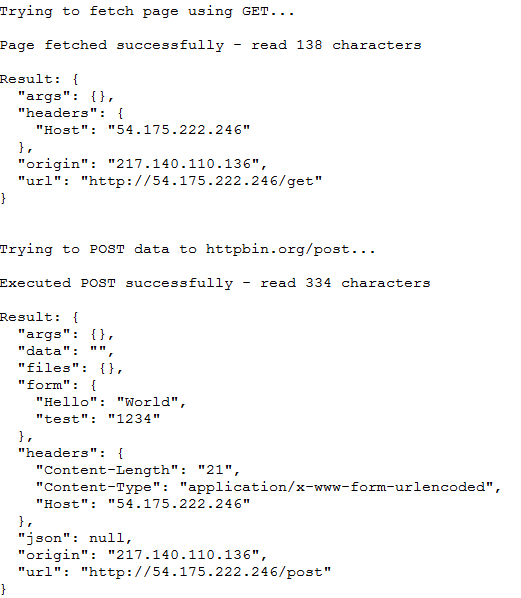HTTP Client with ESP8266 working example
Dependencies: ESP8266Interface HTTPClient-SSL WebSocketClient mbed-rtos mbed
Fork of ESP8266_WebSockets_HelloWorld by
This repository has been superceded
This project has moved to https://developer.mbed.org/teams/ESP8266/code/mbed-os-example-esp8266/
Introduction
This is a basic Hello World program for interfacing the ESP8266 chip with HTTP. It will execute a GET on httpbin.org/get, and a POST to httpbin.org/post.
ESP8266_HTTP_HelloWorld
- change ssid and passphrase to match your wifi connection
- Initialize ESP8266 with DHCP enabled
- Get mbed.org
- Print the information retrieved
- Post to httbin.org
- Print the information retrieved
You can view the information retrieved through a serial terminal set to 9600 baud.
Successful Execution
you should see something like the following on the terminal if the program successfully executes.

main.cpp
- Committer:
- michaeljkoster
- Date:
- 2015-04-20
- Revision:
- 1:f61c1001ee60
- Parent:
- 0:6a891da014a3
- Child:
- 3:5175e53017e4
File content as of revision 1:f61c1001ee60:
#include "mbed.h"
#include "ESP8266Interface.h"
#include "nsdl_support.h"
#include "dbg.h"
#include "UDPSocket.h"
#include "Endpoint.h"
// Include resources
#include "light.h"
Serial pc(USBTX, USBRX); // tx, rx
// ****************************************************************************
// Configuration section
// Ethernet configuration
/* Define this to enable DHCP, otherwise manual address configuration is used */
#define DHCP
/* Manual IP configurations, if DHCP not defined */
#define IP "10.0.0.199"
#define MASK "255.255.255.0"
#define GW "10.0.0.1"
// NSP configuration
/* Change this IP address to that of your NanoService Platform installation */
//static const char* NSP_ADDRESS = "191.239.5.150"; // barista2.cloudapp.net
static const char* NSP_ADDRESS = "108.201.184.41"; // smartobjectservice.com
//static const char* NSP_ADDRESS = "192.168.1.200"; // local mDS server
static const int NSP_PORT = 5683;
char endpoint_name[24] = "mbedDEMO-";
uint8_t ep_type[] = {"DEMO"};
uint8_t lifetime_ptr[] = {"60"};
// ****************************************************************************
// Ethernet initialization
//ESP8266Interface wifi(PA_15,PB_7,PA_14,"demo","ARMDEMO1"); //hack wire
ESP8266Interface wifi(D8,D3,D10,"demo","ARMDEMO1"); //LED strip board
static void ethernet_init()
{
pc.printf("init\r\n");
wifi.init(); // initialize the interface, reset the module
pc.printf("join\r\n");
wifi.join(); // join AP and get DHCP settings
}
// ****************************************************************************
// NSP initialization
UDPSocket server;
Endpoint nsp;
bool UDP_blocking = false;
unsigned int UDP_timeout = 100;
uint8_t macbytes[6] = {0};
char MAC[20] = "665544332211";
static void nsp_init()
{
//pc.printf("socket init\r\n");
server.init();
//pc.printf("socket bind\r\n");
server.bind(0);
pc.printf("set blocking option\r\n");
server.set_blocking(UDP_blocking, UDP_timeout);
pc.printf("set ep address\r\n");
nsp.set_address(NSP_ADDRESS, NSP_PORT);
strncat(endpoint_name, MAC, 12);
NSDL_DEBUG("name: %s", endpoint_name);
NSDL_DEBUG("NSP=%s - port %d\n", NSP_ADDRESS, NSP_PORT);
}
// ****************************************************************************
// Resource creation
static int create_resources()
{
sn_nsdl_resource_info_s *resource_ptr = NULL;
sn_nsdl_ep_parameters_s *endpoint_ptr = NULL;
NSDL_DEBUG("Creating resources");
/* Create resources */
resource_ptr = (sn_nsdl_resource_info_s*)nsdl_alloc(sizeof(sn_nsdl_resource_info_s));
if(!resource_ptr)
return 0;
memset(resource_ptr, 0, sizeof(sn_nsdl_resource_info_s));
resource_ptr->resource_parameters_ptr = (sn_nsdl_resource_parameters_s*)nsdl_alloc(sizeof(sn_nsdl_resource_parameters_s));
if(!resource_ptr->resource_parameters_ptr)
{
nsdl_free(resource_ptr);
return 0;
}
memset(resource_ptr->resource_parameters_ptr, 0, sizeof(sn_nsdl_resource_parameters_s));
// Static resources
nsdl_create_static_resource(resource_ptr, sizeof("3/0/0")-1, (uint8_t*) "3/0/0", 0, 0, (uint8_t*) "mbedDEMO", sizeof("mbedDEMO")-1);
nsdl_create_static_resource(resource_ptr, sizeof("3/0/1")-1, (uint8_t*) "3/0/1", 0, 0, (uint8_t*) "DEMO", sizeof("DEMO")-1);
// Dynamic resources
create_light_resource(resource_ptr);
/* Register with NSP */
endpoint_ptr = nsdl_init_register_endpoint(endpoint_ptr, (uint8_t*)endpoint_name, ep_type, lifetime_ptr);
if(sn_nsdl_register_endpoint(endpoint_ptr) != 0)
pc.printf("NSP registering failed\r\n");
else
pc.printf("NSP registering OK\r\n");
nsdl_clean_register_endpoint(&endpoint_ptr);
nsdl_free(resource_ptr->resource_parameters_ptr);
nsdl_free(resource_ptr);
return 1;
}
// ****************************************************************************
// Program entry point
int main()
{
pc.baud(9600); // why do we need to match the ESP8266 serial rate?
pc.printf("SystemCoreClock=: %d\r\n", SystemCoreClock / 1000000) ;
NSDL_DEBUG("Hello mDS Demo Endpoint Application\n");
// Initialize Ethernet interface first
ethernet_init();
// Initialize NSP node
nsp_init();
// Initialize NSDL stack
nsdl_init();
// Create NSDL resources
create_resources();
// Run the NSDL event loop (never returns)
nsdl_event_loop();
}
 ESP8266
ESP8266
